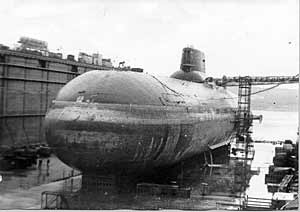
Arctic Frontiers: Disinformation, Security and the Northern Sea Route
Bellona held a seminar on countering Russian disinformation in the Arctic at the Arctic Frontiers international conference in Norway
News

Publish date: March 31, 2016
News
Dozens of world leaders have descended on Washington for a major summit hosted by President Barack Obama to discuss protecting nuclear installations worldwide from terrorists, but perhaps the most conspicuous attendee is the one that’s not there: Russia.
The three-day Nuclear Security Summit, a biannual event, which is the brainchild of Obama, has gathered world nuclear powers in the hopes of securing nuclear materials and facilities from the threat of terrorists and smugglers in 2010, 2012 and 2014 – though its successes have been limited.
This summit will be Obama’s last, and Russia has attended all the previous summits in the spirit of a decades long bilateral process with the US to button down the post-Soviet shambles of Russia’s nuclear military complex.
But this year Russia is loudly bowing out in the form of a boycott. Headlines in Russian official media say the summit – and really any cooperation with the US – has nothing to offer the Kremlin.
“At the present time, the political agenda of such meetings have exhausted the faith [of the Russian government],” the Russian Foreign Ministry told official mouthpiece Izvestiya.
 Putin in past talks with President Barack Obama. (Photo: Kremlin.ru)
Putin in past talks with President Barack Obama. (Photo: Kremlin.ru)
The article goes on to accuse Western powers of superimposing their own view of nuclear security on the summit’s participants at the expense of recognized authorities like the International Atomic Energy Agency.
And President Vladimir Putin has made clear in many television addresses that he won’t engage in further nuclear cleanup efforts dominated by the United States.
“I think nuclear cooperation between US and Russian is dead,” said Nils Bøhmer, Bellona’s executive director and nuclear physicist. “Unfortunately, the window of opportunity to reduce [Russia’s] nuclear stockpile is closed for now.”
Indeed, numerous programs between the US and Russia have fallen into terminal neglect or been outright halted by the Russian side.
The biggest blow came in January 2015 when Russia pulled out of the quarter-century-old Nunn-Lugar program, which worked with the Russian military to destroy hundreds of nuclear weapons and nuclear powered submarines.
It also helped pay salaries of Russian weapons technicians to prevent them from pedaling their knowledge to hostile countries, and bolstered security at dilapidated weapons and fissile materials storage sites.
But more than a dozen of these facilities still remain unsecured.
Also left by the wayside is the long-standing, and arduous cooperative effort by the two countries to destroy 34 metric tons of surplus weapons plutonium. The program faltered on the shoals of its enormous expense and 14 years of dispute over just how each country would dispose of its excess plutonium.
Russia plans to burn its old weapons plutonium in its breeder reactors at Beloyarsk, while the US is apparently seeking to dilute and store its stocks at a federal nuclear waste repository in New Mexico.
But both countries are forging ahead with their plans on a unilateral basis.
 A plutonium 'button' being handled at the Savannah River Site. (Photo: Wikipedia)
A plutonium 'button' being handled at the Savannah River Site. (Photo: Wikipedia)
These fractured relations are an especially bad thing, especially when cast across the backdrop of rising international terrorism, most recently the bombings in Brussels, said Bøhmer.
A particularly chilling footnote to that atrocity was the discovery that one of its plotters possessed surveillance footage of a top Belgian nuclear official, suggesting the Islamic State terrorist group that carried out the mass bombings is trying to obtain radioactive material for a terrorist attack.
That makes Russia’s RSVP in the negative to the summit perplexing to many in the Washington nonproliferation establishment, who say Russia, too, has an interest in stemming the threat of nuclear terrorism.
Rose Gottemoeller, the U.S. State Department’s top official for arms control treaties told a March 29 briefing in Washington that, “Frankly, we’re scratching our heads a bit,” as quoted by Radio Free Europe.
Gottemoeller, who previously worked with the US Department of Energy, helped broker many of the cooperative nonproliferation efforts undertaken by the Nunn-Lugar program.
But Andrei Zolotkov, a nuclear adviser with Bellona in Murmansk said Russia’s rabid anti-Americanism makes the Russian boycott totally unsurprising.
“Our national press has very much politicized the issue,” he wrote in an email. “They’re discussing not so much the theme of the summit as much as the necessity of Russia attending such summits.”
In particular, he said, the official press has carried the message that top Russian leadership refuses to visit “the lair of its number one enemy and have any kind of contact with the US.”
“It’s clear politics at 146 percent,” Zolotkov said.
Despite the Russian boycott, Gottemoeller said there were still areas where the US and Russia continue cooperation.
“The best thing I can say is it’s a mixed picture. There are areas of very sound cooperation with Russia, where we are proceeding and continuing to make progress,” she said.

Bellona held a seminar on countering Russian disinformation in the Arctic at the Arctic Frontiers international conference in Norway

Our December Nuclear Digest, reported by Bellona’s Environmental Transparency Center, is out now. Here’s a quick taste of three nuclear issues arisin...

Bellona has launched the Oslofjord Kelp Park, a pilot kelp cultivation facility outside Slemmestad, about 30 kilometers southwest of Oslo, aimed at r...

Our November Nuclear Digest by Bellona’s Environmental Transparency Center is out now. Here’s a quick taste of just three nuclear issues arising in U...